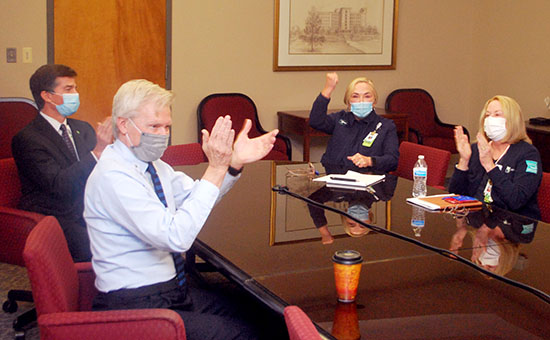St. Joseph’s Hospital and Candler Hospital earn national recognition for nursing excellence for the fifth time
Dec 17, 2020
There are only 22 other hospitals in the world who have earned a fifth designation
For the fifth time, nurses at St. Joseph’s/Candler have proven to provide the highest level of nursing care, earning The American Nurses Credentialing Center’s (ANCC) Magnet Recognition®.
There are only 22 other hospitals in the world who have earned a fifth designation. Established in 1994, the Magnet® designation is the highest level of recognition that can be accomplished by organized nursing services in the national and international healthcare communities.

“This is an incredible accomplishment by our nursing staff. The Magnet designation proves that the skills of our nurses give our patients better outcomes,” said Paul P. Hinchey, President & CEO of St. Joseph’s/Candler. “To earn a Magnet national award for the fifth time illustrates the expertise, dedication and values of each of our nurses and how effectively they can work as a group. Of the 5,000 hospitals in the country, fewer than 5 percent have five designations, which is quite remarkable.”
St. Joseph’s Hospital and Candler Hospital are two of only 10 Magnet-designated facilities in Georgia and 547 in the world. Each hospital achieved their own Magnet designation.
“Magnet designation shows that our nurses are part of an elite group and our patients can know that they will get the best outcomes with the safest experience. They can depend on us when they come here,” said Sherry Danello, DHA, MSN, RN, NEA-BC, Vice President of Patient Care Services at St. Joseph’s/Candler and Chief Nursing Officer. “It says a lot about the whole organization because this could not be achieved without the commitment of all of our co-workers, senior leadership, the medical staff and the Board of Trustees.”
St. Joseph’s/Candler showed the Magnet evaluators how the 1,323 nurses in the system were able to improve patient outcomes. During the last eight quarters, the health system outperformed the Magnet standards on:
- Hospital-acquired pressure ulcers.
- Central Line-Associate Bloodstream Infections.
- Patient falls with injury.
- Patient satisfaction with discharge education.
- Time from patient arrival to EKG for cardiac patients.
- Stroke education.
To achieve initial Magnet recognition, organizations must pass a rigorous and lengthy process that demands widespread participation from leadership and staff. The process begins with the submission of an electronic application, followed by written documentation demonstrating qualitative and quantitative evidence regarding patient care and outcomes.
If scores from the written documentation fall within a range of excellence, an on-site appraisal occurs to thoroughly assess the applicant. After this rigorous on-site review process, the Commission on Magnet reviews the completed appraisal report and votes to determine whether Magnet recognition will be granted.
An organization seeking to reapply for Magnet recognition must provide documented evidence of how Magnet concepts, performance, and quality were sustained and improved over the five-year period since the hospital received its 2015 recognition.
In particular, the Magnet model is designed to provide a framework for nursing practice, research, and measurement of outcomes. Through this framework, ANCC can assess applicants across a number of components and dimensions to gauge an organization’s nursing excellence.
The foundation of this model is composed of various elements deemed essential to delivering superior patient care. These include the quality of nursing leadership and coordination and collaboration across specialties, as well as processes for measuring and improving the quality and delivery of care.
Magnet recognition has been shown to provide specific benefits to hospitals and their communities, such as
- Higher patient satisfaction with nurse communication, availability of help, and receipt of discharge information
- Lower risk of 30-day mortality and lower failure to rescue
- Higher job satisfaction among nurses
- Higher nurse retention